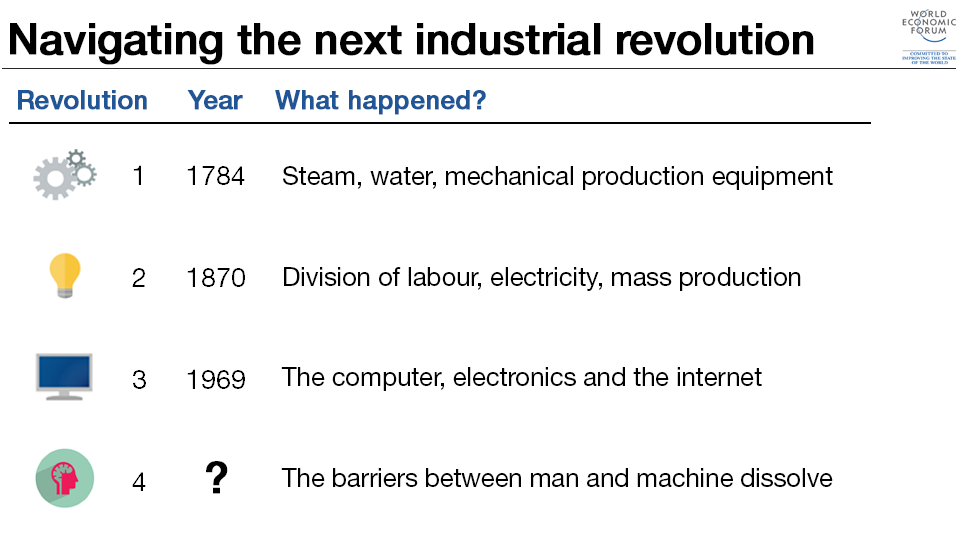3 key questions for the digital revolution

"We may well be on the cusp of a major societal transformation" Image: REUTERS/Fabian Bimmer
As global leaders from business, government, academia and civil society gather in Davos-Klosters for the Annual Meeting 2016 to discuss the central theme of the Fourth Industrial Revolution, they will undoubtedly agree that digitization is profoundly reshaping all aspects of how we live and work.

Beyond that, however, agreement is likely to be harder to find. The experiences of digitization are very different and not all implications are understood. Opinion varies wildly on whether digitalization will have a positive or negative impact on issues such as jobs, inequality and security. We may well be on the cusp of a major societal transformation, but the precise impact of that shift remains uncertain.
To help bring clarity to some of these future uncertainties, the World Economic Forum has embarked upon a multi-year initiative to investigate and understand the impact of digital transformation on business and society. In this, the first year of the Digital Transformation of Industries initiative, we have spoken to more than 200 experts and leaders, engaged with more than 100 member companies and conducted numerous workshops around the world. While there is a large number of findings, there are three key ones in particular I would urge leaders to understand and debate in the coming days, weeks and months.
The impact on the global economy
The first headline is that it is becoming increasingly clear that digitization can help address some of the most pressing challenges facing the global economy today. For example, based on our analysis of a number of industries, we estimate that the mass adoption of autonomous vehicles and usage-based car insurance could save up to 1 million lives by 2025. Digital transformation in the logistics industry alone could help reduce carbon emissions by as much as 3.6 billion metric tons over the next decade. More than 2 million net jobs could be created from digital initiatives by 2025 in the consumer, electricity and logistics industries. In purely economic terms, our value-at-stake analysis suggests that the cumulative gains for both industry and society could reach as much as $100 trillion by 2025. This is early analysis, but it points to huge future potential.
The impact on jobs
Second, at the macro level, a number of obstacles and challenges need to be overcome if that potential is to be realized. Job creation will inevitably be accompanied by job loss, placing a huge premium on the ability to re- and up-skill workers for the machine age. Many of the incentives required for businesses and governments to collaborate and deliver societal benefits from digitalization are not yet in place.
For example, making usage-based car insurance mandatory would require public-private collaborative action from regulators, Original Equipment Manufacturers (OEMs), insurers and consumer groups. Furthermore, regulation is struggling to adapt to the pace of technological change—how to deal with drone technology provides a good case in point. Many systemic enablers need to be in place if digitalization is to flourish for society as well as industry.
The impact on organisations
Third, at the organisational level, it is clear that companies, governments and regulators alike will need to develop new capabilities in order to adapt fully to a digital future. Through our analysis of leading practices of enterprise-level digitization, a number of strategic questions have emerged. For example, does your company have a digitally literate and multigenerational supervisory and executive board that owns and drives ‘digital’ as a theme throughout your organization? Are you able to communicate the socio-economic impact of your digital initiatives with stakeholders, internal and external? How could new policy frameworks help realize societal benefits from digitalization in the short- and medium-term? There are many more questions to address besides these, and learning from emerging best practice will be paramount.
Indeed, finding answers to these questions and building the necessary capabilities will not be easy. But it is essential if we are to ensure that the Fourth Industrial Revolution is guided by a ‘north star’ where market and societal forces align. I look forward to many conversations at the Annual Meeting 2016 about how to make that happen, and also look forward to taking that dialogue forward over the coming months and years. It is essential for the future prosperity and stability of the global economy, and society as a whole, that we do so.
Author: Jim Snabe is Chairman of the World Economic Forum USA and of the Centre for Global Industries.
Don't miss any update on this topic
Create a free account and access your personalized content collection with our latest publications and analyses.
License and Republishing
World Economic Forum articles may be republished in accordance with the Creative Commons Attribution-NonCommercial-NoDerivatives 4.0 International Public License, and in accordance with our Terms of Use.
The views expressed in this article are those of the author alone and not the World Economic Forum.
Forum Stories newsletter
Bringing you weekly curated insights and analysis on the global issues that matter.
More on Forum in FocusSee all
Gayle Markovitz
October 29, 2025






